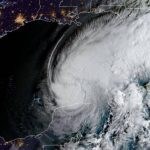The Chinese Long March 5B rocket has re-entered the earth’s atmosphere from the Arabian Peninsula.
Kuwait, Oman, Qatar, Saudi Arabia, the United Arab Emirates (UAE), Yemen, and parts of Iraq and Jordan make up the Arabian Peninsula.
#USSPACECOM can confirm Chinese #LongMarch5B re-entered over the Arabian Peninsula at approximately 10:15 pm EDT on May 8. It is unknown if the debris impacted land or water. https://t.co/4Ol9Sa2iJo
— U.S. Space Command (@US_SpaceCom) May 9, 2021
The United States Space Command confirmed this in a press release on Sunday.
It noted that, “the Chinese Long March 5B re-entered over the Arabian Peninsula at approximately 10:15 p.m. EDT on May 8.
“It is unknown if the debris impacted land or water.”
Furthermore, the Command said it would not give in depth details about the impact of the machine on the area.
“USSPACECOM does not conduct direct notifications to individual governments. The exact location of the impact and the span of debris, both of which are unknown at this time, will not be released by U.S. Space Command,” it stated.
But China state media reports that the debris of the rocket landed at the Indian Ocean, while part of it disintegrated on air.
The disclosure has countered the predictions of certain scientists.
The Chinese Government had notified the world that one of its rockets in space was crashing back to the earth.
China’s Foreign Affairs spokesperson, Wang Wenbin, told the press on Friday that “Most parts of the upper stage of Long March-5B Y2 rocket will burn up upon re-entry, which is in line with international common practice,” he said.
But NBS reported that, “Scientists say the risk of it killing anyone after it re-enters the planet’s atmosphere is small but not impossible: There is a tiny chance the debris could hit New York, Los Angeles, Madrid, Rio de Janeiro, the Nigerian capital of Abuja or Beijing. It will more likely land in an ocean or the wilderness.”
The development had elicited fear in people who took to Twitter to express their thoughts.
The Chinese Long March 5B rocket has re-entered the earth’s atmosphere from the Arabian Peninsula.
Kuwait, Oman, Qatar, Saudi Arabia, the United Arab Emirates (UAE), Yemen, and parts of Iraq and Jordan make up the Arabian Peninsula.
#USSPACECOM can confirm Chinese #LongMarch5B re-entered over the Arabian Peninsula at approximately 10:15 pm EDT on May 8. It is unknown if the debris impacted land or water. https://t.co/4Ol9Sa2iJo
— U.S. Space Command (@US_SpaceCom) May 9, 2021
The United States Space Command confirmed this in a press release on Sunday.
It noted that, “the Chinese Long March 5B re-entered over the Arabian Peninsula at approximately 10:15 p.m. EDT on May 8.
“It is unknown if the debris impacted land or water.”
Furthermore, the Command said it would not give in depth details about the impact of the machine on the area.
“USSPACECOM does not conduct direct notifications to individual governments. The exact location of the impact and the span of debris, both of which are unknown at this time, will not be released by U.S. Space Command,” it stated.
But China state media reports that the debris of the rocket landed at the Indian Ocean, while part of it disintegrated on air.
The disclosure has countered the predictions of certain scientists.
The Chinese Government had notified the world that one of its rockets in space was crashing back to the earth.
China’s Foreign Affairs spokesperson, Wang Wenbin, told the press on Friday that “Most parts of the upper stage of Long March-5B Y2 rocket will burn up upon re-entry, which is in line with international common practice,” he said.
But NBS reported that, “Scientists say the risk of it killing anyone after it re-enters the planet’s atmosphere is small but not impossible: There is a tiny chance the debris could hit New York, Los Angeles, Madrid, Rio de Janeiro, the Nigerian capital of Abuja or Beijing. It will more likely land in an ocean or the wilderness.”
The development had elicited fear in people who took to Twitter to express their thoughts.
The Chinese Long March 5B rocket has re-entered the earth’s atmosphere from the Arabian Peninsula.
Kuwait, Oman, Qatar, Saudi Arabia, the United Arab Emirates (UAE), Yemen, and parts of Iraq and Jordan make up the Arabian Peninsula.
#USSPACECOM can confirm Chinese #LongMarch5B re-entered over the Arabian Peninsula at approximately 10:15 pm EDT on May 8. It is unknown if the debris impacted land or water. https://t.co/4Ol9Sa2iJo
— U.S. Space Command (@US_SpaceCom) May 9, 2021
The United States Space Command confirmed this in a press release on Sunday.
It noted that, “the Chinese Long March 5B re-entered over the Arabian Peninsula at approximately 10:15 p.m. EDT on May 8.
“It is unknown if the debris impacted land or water.”
Furthermore, the Command said it would not give in depth details about the impact of the machine on the area.
“USSPACECOM does not conduct direct notifications to individual governments. The exact location of the impact and the span of debris, both of which are unknown at this time, will not be released by U.S. Space Command,” it stated.
But China state media reports that the debris of the rocket landed at the Indian Ocean, while part of it disintegrated on air.
The disclosure has countered the predictions of certain scientists.
The Chinese Government had notified the world that one of its rockets in space was crashing back to the earth.
China’s Foreign Affairs spokesperson, Wang Wenbin, told the press on Friday that “Most parts of the upper stage of Long March-5B Y2 rocket will burn up upon re-entry, which is in line with international common practice,” he said.
But NBS reported that, “Scientists say the risk of it killing anyone after it re-enters the planet’s atmosphere is small but not impossible: There is a tiny chance the debris could hit New York, Los Angeles, Madrid, Rio de Janeiro, the Nigerian capital of Abuja or Beijing. It will more likely land in an ocean or the wilderness.”
The development had elicited fear in people who took to Twitter to express their thoughts.
The Chinese Long March 5B rocket has re-entered the earth’s atmosphere from the Arabian Peninsula.
Kuwait, Oman, Qatar, Saudi Arabia, the United Arab Emirates (UAE), Yemen, and parts of Iraq and Jordan make up the Arabian Peninsula.
#USSPACECOM can confirm Chinese #LongMarch5B re-entered over the Arabian Peninsula at approximately 10:15 pm EDT on May 8. It is unknown if the debris impacted land or water. https://t.co/4Ol9Sa2iJo
— U.S. Space Command (@US_SpaceCom) May 9, 2021
The United States Space Command confirmed this in a press release on Sunday.
It noted that, “the Chinese Long March 5B re-entered over the Arabian Peninsula at approximately 10:15 p.m. EDT on May 8.
“It is unknown if the debris impacted land or water.”
Furthermore, the Command said it would not give in depth details about the impact of the machine on the area.
“USSPACECOM does not conduct direct notifications to individual governments. The exact location of the impact and the span of debris, both of which are unknown at this time, will not be released by U.S. Space Command,” it stated.
But China state media reports that the debris of the rocket landed at the Indian Ocean, while part of it disintegrated on air.
The disclosure has countered the predictions of certain scientists.
The Chinese Government had notified the world that one of its rockets in space was crashing back to the earth.
China’s Foreign Affairs spokesperson, Wang Wenbin, told the press on Friday that “Most parts of the upper stage of Long March-5B Y2 rocket will burn up upon re-entry, which is in line with international common practice,” he said.
But NBS reported that, “Scientists say the risk of it killing anyone after it re-enters the planet’s atmosphere is small but not impossible: There is a tiny chance the debris could hit New York, Los Angeles, Madrid, Rio de Janeiro, the Nigerian capital of Abuja or Beijing. It will more likely land in an ocean or the wilderness.”
The development had elicited fear in people who took to Twitter to express their thoughts.
The Chinese Long March 5B rocket has re-entered the earth’s atmosphere from the Arabian Peninsula.
Kuwait, Oman, Qatar, Saudi Arabia, the United Arab Emirates (UAE), Yemen, and parts of Iraq and Jordan make up the Arabian Peninsula.
#USSPACECOM can confirm Chinese #LongMarch5B re-entered over the Arabian Peninsula at approximately 10:15 pm EDT on May 8. It is unknown if the debris impacted land or water. https://t.co/4Ol9Sa2iJo
— U.S. Space Command (@US_SpaceCom) May 9, 2021
The United States Space Command confirmed this in a press release on Sunday.
It noted that, “the Chinese Long March 5B re-entered over the Arabian Peninsula at approximately 10:15 p.m. EDT on May 8.
“It is unknown if the debris impacted land or water.”
Furthermore, the Command said it would not give in depth details about the impact of the machine on the area.
“USSPACECOM does not conduct direct notifications to individual governments. The exact location of the impact and the span of debris, both of which are unknown at this time, will not be released by U.S. Space Command,” it stated.
But China state media reports that the debris of the rocket landed at the Indian Ocean, while part of it disintegrated on air.
The disclosure has countered the predictions of certain scientists.
The Chinese Government had notified the world that one of its rockets in space was crashing back to the earth.
China’s Foreign Affairs spokesperson, Wang Wenbin, told the press on Friday that “Most parts of the upper stage of Long March-5B Y2 rocket will burn up upon re-entry, which is in line with international common practice,” he said.
But NBS reported that, “Scientists say the risk of it killing anyone after it re-enters the planet’s atmosphere is small but not impossible: There is a tiny chance the debris could hit New York, Los Angeles, Madrid, Rio de Janeiro, the Nigerian capital of Abuja or Beijing. It will more likely land in an ocean or the wilderness.”
The development had elicited fear in people who took to Twitter to express their thoughts.
The Chinese Long March 5B rocket has re-entered the earth’s atmosphere from the Arabian Peninsula.
Kuwait, Oman, Qatar, Saudi Arabia, the United Arab Emirates (UAE), Yemen, and parts of Iraq and Jordan make up the Arabian Peninsula.
#USSPACECOM can confirm Chinese #LongMarch5B re-entered over the Arabian Peninsula at approximately 10:15 pm EDT on May 8. It is unknown if the debris impacted land or water. https://t.co/4Ol9Sa2iJo
— U.S. Space Command (@US_SpaceCom) May 9, 2021
The United States Space Command confirmed this in a press release on Sunday.
It noted that, “the Chinese Long March 5B re-entered over the Arabian Peninsula at approximately 10:15 p.m. EDT on May 8.
“It is unknown if the debris impacted land or water.”
Furthermore, the Command said it would not give in depth details about the impact of the machine on the area.
“USSPACECOM does not conduct direct notifications to individual governments. The exact location of the impact and the span of debris, both of which are unknown at this time, will not be released by U.S. Space Command,” it stated.
But China state media reports that the debris of the rocket landed at the Indian Ocean, while part of it disintegrated on air.
The disclosure has countered the predictions of certain scientists.
The Chinese Government had notified the world that one of its rockets in space was crashing back to the earth.
China’s Foreign Affairs spokesperson, Wang Wenbin, told the press on Friday that “Most parts of the upper stage of Long March-5B Y2 rocket will burn up upon re-entry, which is in line with international common practice,” he said.
But NBS reported that, “Scientists say the risk of it killing anyone after it re-enters the planet’s atmosphere is small but not impossible: There is a tiny chance the debris could hit New York, Los Angeles, Madrid, Rio de Janeiro, the Nigerian capital of Abuja or Beijing. It will more likely land in an ocean or the wilderness.”
The development had elicited fear in people who took to Twitter to express their thoughts.
The Chinese Long March 5B rocket has re-entered the earth’s atmosphere from the Arabian Peninsula.
Kuwait, Oman, Qatar, Saudi Arabia, the United Arab Emirates (UAE), Yemen, and parts of Iraq and Jordan make up the Arabian Peninsula.
#USSPACECOM can confirm Chinese #LongMarch5B re-entered over the Arabian Peninsula at approximately 10:15 pm EDT on May 8. It is unknown if the debris impacted land or water. https://t.co/4Ol9Sa2iJo
— U.S. Space Command (@US_SpaceCom) May 9, 2021
The United States Space Command confirmed this in a press release on Sunday.
It noted that, “the Chinese Long March 5B re-entered over the Arabian Peninsula at approximately 10:15 p.m. EDT on May 8.
“It is unknown if the debris impacted land or water.”
Furthermore, the Command said it would not give in depth details about the impact of the machine on the area.
“USSPACECOM does not conduct direct notifications to individual governments. The exact location of the impact and the span of debris, both of which are unknown at this time, will not be released by U.S. Space Command,” it stated.
But China state media reports that the debris of the rocket landed at the Indian Ocean, while part of it disintegrated on air.
The disclosure has countered the predictions of certain scientists.
The Chinese Government had notified the world that one of its rockets in space was crashing back to the earth.
China’s Foreign Affairs spokesperson, Wang Wenbin, told the press on Friday that “Most parts of the upper stage of Long March-5B Y2 rocket will burn up upon re-entry, which is in line with international common practice,” he said.
But NBS reported that, “Scientists say the risk of it killing anyone after it re-enters the planet’s atmosphere is small but not impossible: There is a tiny chance the debris could hit New York, Los Angeles, Madrid, Rio de Janeiro, the Nigerian capital of Abuja or Beijing. It will more likely land in an ocean or the wilderness.”
The development had elicited fear in people who took to Twitter to express their thoughts.
The Chinese Long March 5B rocket has re-entered the earth’s atmosphere from the Arabian Peninsula.
Kuwait, Oman, Qatar, Saudi Arabia, the United Arab Emirates (UAE), Yemen, and parts of Iraq and Jordan make up the Arabian Peninsula.
#USSPACECOM can confirm Chinese #LongMarch5B re-entered over the Arabian Peninsula at approximately 10:15 pm EDT on May 8. It is unknown if the debris impacted land or water. https://t.co/4Ol9Sa2iJo
— U.S. Space Command (@US_SpaceCom) May 9, 2021
The United States Space Command confirmed this in a press release on Sunday.
It noted that, “the Chinese Long March 5B re-entered over the Arabian Peninsula at approximately 10:15 p.m. EDT on May 8.
“It is unknown if the debris impacted land or water.”
Furthermore, the Command said it would not give in depth details about the impact of the machine on the area.
“USSPACECOM does not conduct direct notifications to individual governments. The exact location of the impact and the span of debris, both of which are unknown at this time, will not be released by U.S. Space Command,” it stated.
But China state media reports that the debris of the rocket landed at the Indian Ocean, while part of it disintegrated on air.
The disclosure has countered the predictions of certain scientists.
The Chinese Government had notified the world that one of its rockets in space was crashing back to the earth.
China’s Foreign Affairs spokesperson, Wang Wenbin, told the press on Friday that “Most parts of the upper stage of Long March-5B Y2 rocket will burn up upon re-entry, which is in line with international common practice,” he said.
But NBS reported that, “Scientists say the risk of it killing anyone after it re-enters the planet’s atmosphere is small but not impossible: There is a tiny chance the debris could hit New York, Los Angeles, Madrid, Rio de Janeiro, the Nigerian capital of Abuja or Beijing. It will more likely land in an ocean or the wilderness.”
The development had elicited fear in people who took to Twitter to express their thoughts.













